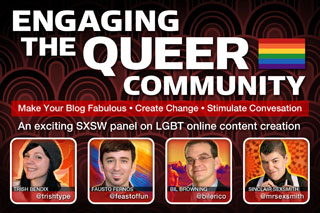One of the wonderful things about the web is that you can create and join communities of people that are just like you. However if you want the type of content that keeps people coming back for more, you have to know a lot about your audience. We spoke to Trish Bendix of MTV/AfterEllen.com about her upcoming SXSWi panel called “Engaging the Queer Community” and asked her what it takes to maintain successful and active blogs and social networking sites that are geared toward the LGBT community and its niches.
1. How can you effectively use social media to reach new readers in the LGBT community and stand out among the competition?
Social media applications like Facebook and Twitter allow you to reach new readers by keywords, hashtags and retweets. It also allows for you to establish a direct connection with readers by communicating with them and providing them with links to content not only on your own site, but on others that they might be interested in. By developing a social media relationship with them, they consider you an important resource that they can also feel a part of. In the LGBT community, this is important because we don’t always get to have a say in how we’re portrayed in the media, entertainment or society at large. By developing relationships in social media with readers and prospective readers, you will become more reputable and able to stand out amongst those that don’t embrace them or utilize them to their advantage.
2. What are some of the problems/issues you might encounter within or among the younger vs. older generations of the LGBT community?
The LGBT community is incredibly diverse, so attempting to reach all women who identify as gay in some way, while also attending to women of different origins, races and ages can be difficult. It’s one site attempting to speak to and for an entire minority. On AfterEllen.com, we try to have our writers mirror our readers, so that we have older bloggers who are more apt to cover topics that are of interest to readers of a certain age. It’s the best way to give authenticity to the site and to a topic – have someone with a direct relationship to that part of the community speak for that community.
3. What are some of the responsibilities of LGBT websites/blogs/communities?
We have a large responsibility to cover content critically but also an understanding that not everyone is as educated on LGBT issues as we’d like them to be. Because so much news on the LGBT community can be bad news, you have to try to establish a fair balance of analysis with snark and a positive outlook on what can come in the future. It’s our responsibility to deliver news and commentary on social and societal issues, but not in a depressing, disheartening way.
4. What conclusion do you hope the audience will take from your panel?
My hope is that we’ll spawn a discussion of our responsibilities and the state of the LGBT online media. I’m looking forward to sharing ideas about having our voices heard in both our own sites and on the internet at large, and to establish the best ways to find a broad queer audience that is interested in participating as much as they are in reading.


Permalink